OKX Supported and Restricted Countries
.webp)
Summary: OKX serves over 50 million users across more than 100 countries, offering access to 100+ fiat currencies, 900+ payment methods, and regulated services in key regions like the EU (via MiCA), Singapore (MPI license), Dubai (VARA), and the US (through OKCoin USA).
At the same time, OKX restricts access in Afghanistan, Iran, North Korea, Syria, Cuba, Canada, El Salvador, Hong Kong, India, Japan, Malaysia, Nigeria, Uzbekistan, Crimea, Donetsk, Luhansk, and all US states and territories, reflecting bans, sanctions, and compliance limits.
OKX is a global cryptocurrency exchange serving over 50 million users across 100+ countries, offering access to fiat, crypto, and DeFi products, though restrictions apply in regions with bans, sanctions, or licensing limits.
Supported Countries
China, Russia, Australia, Singapore & 100+ more
Restricted Coutnries
USA, UK, Canada, Japan, France, Iran, India, Nepal & more
Headquarters
Seychelles (main), Singapore, Malta, Dubai, Bahamas & HK
What Countries Does OKX Restrict?
According to Section 3 (Regulatory Landscape) of the official OKX Risk & Compliance Disclosure, the platform currently restricts users in more than twenty countries and regions worldwide. These limitations stem from international sanctions, local bans on cryptocurrencies, and regulatory licensing requirements.
Below is a grouped breakdown of the restricted locations:
- Afghanistan, Iran, North Korea, Syria, Cuba: Classified as high-sanctioned jurisdictions; global sanctions make it impossible to legally provide crypto or financial services.
- Algeria, Bangladesh, Bolivia, Nepal: Each enforces strict national bans; local central banks prohibit holding, using, or transacting with cryptocurrencies.
- Canada, El Salvador, Hong Kong, India, Japan, Malaysia, Nigeria, Uzbekistan: Selective restriction markets; limited services due to licensing gaps or inconsistent local regulation.
- Crimea, Donetsk, Luhansk: Conflict-affected regions; restricted in line with international sanctions tied to disputed territories and unlawful occupation.
- United States and territories: Puerto Rico, Guam, American Samoa, Northern Mariana Islands, US Virgin Islands face full restriction as US federal and state regulators prevent OKX operation.
OKX also limits certain products in countries where full bans do not apply. Examples include restrictions on perpetual futures trading in Australia, Brazil, South Korea, and the UK, retail limits in the Bahamas, P2P restrictions in Eritrea, and fiat payment limits in Russia.
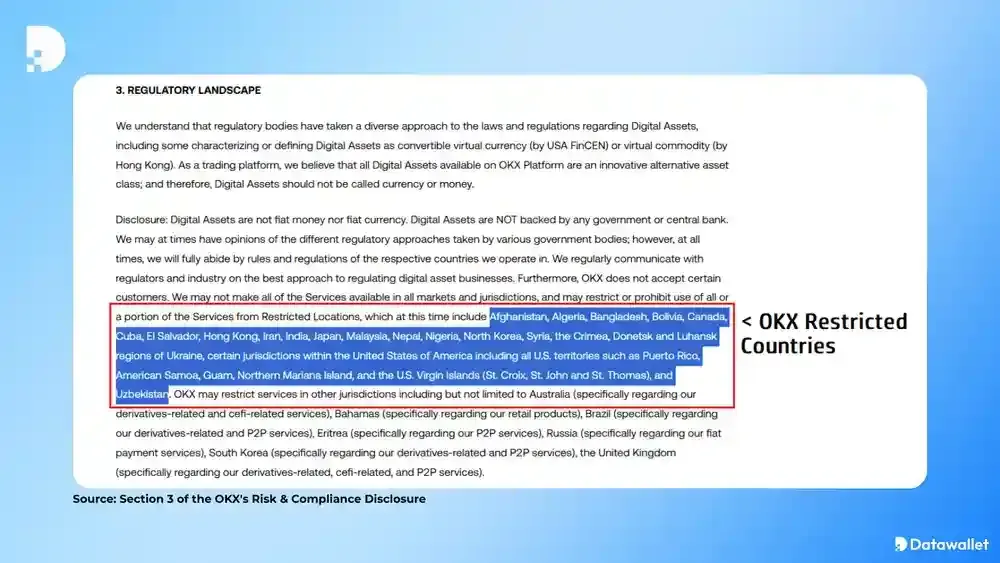
OKX Supported Countries
OKX supports over 50 million users across more than 100 countries, making it one of the largest global crypto exchanges. Its user base spans Asia, Europe, the Americas, Africa, and the Middle East, with strong adoption in both developed and emerging economies.
The exchange provides access to over 100 fiat currencies and more than 900 local payment methods for deposits and peer-to-peer trading. Popular supported fiats include USD, EUR, GBP, JPY, BRL, MXN, and VND, covering major global markets and regional trade hubs.
According to Similarweb, Japan (14.16%), the United States (13.88%), Brazil (6.17%), Mexico (5.73%), and Vietnam (5.34%) account for the largest shares of platform traffic. The remaining 54.71% comes from other countries, showing a broad distribution of users and strong international penetration.
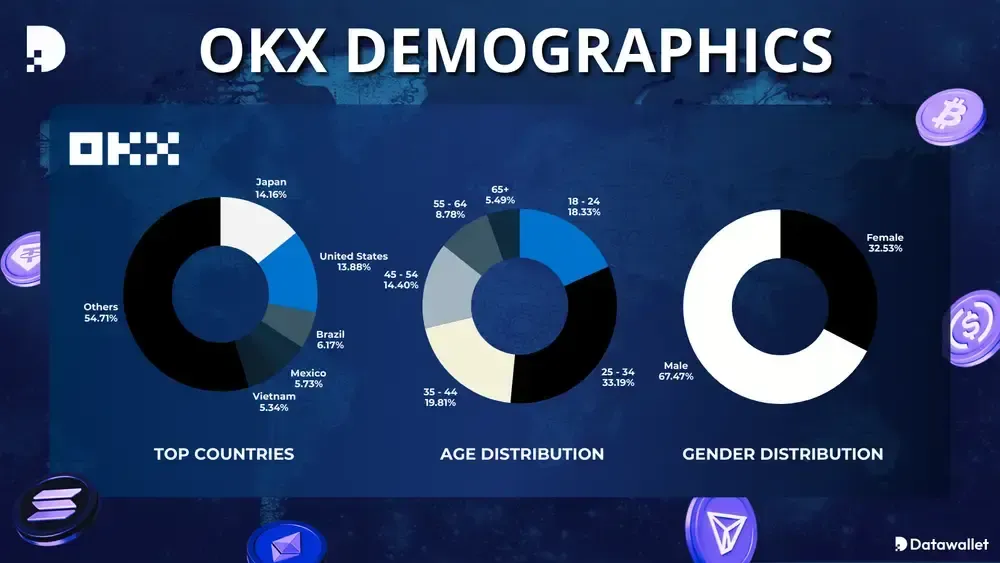
OKX Licensing and Regulation
OKX operates under a patchwork of licenses and registrations across global jurisdictions, reflecting its effort to meet local compliance requirements. These licenses cover markets in Asia, Europe, the Americas, and the Middle East, with both active approvals and pending applications.
Here are the regulatory authorizations and licenses held by OKX and its regional entities:
- Seychelles: Licensed as a Virtual Asset Service Provider (VASP) by the Financial Services Authority (FSA) through Aux Cayes FinTech Co. Ltd.
- United Arab Emirates: Holds a Virtual Assets Regulatory Authority (VARA) VASP license in Dubai; awaiting full operational approval for exchange services.
- Hong Kong: Operating as OKX HK; in the final stages of securing a VASP license from the Securities and Futures Commission (SFC).
- European Economic Area (EEA): OKCoin Europe Ltd, based in Malta, is passporting a MiCA license across all 30 EU/EEA states, enabling euro-denominated services.
- Australia: OKX Australia Pty Ltd and OKX Australia Financial Pty Ltd are registered with ASIC to provide compliant crypto exchange services.
- Singapore: OKX SG Pte. Ltd. holds an MAS Major Payment Institution (MPI) license for digital payment token and money transfer services.
- Bahamas: OKX Bahamas FinTech Company Limited was licensed by the Securities Commission of The Bahamas (SCB); previously serviced Mexican users.
- United States: OKCoin USA Inc., registered with FinCEN and licensed at the state level as a Money Transmitter, operates the US platform under local law.
- Netherlands: Registered with De Nederlandsche Bank (DNB) for crypto-to-fiat services, ensuring compliance with Dutch and EU anti-money laundering rules.
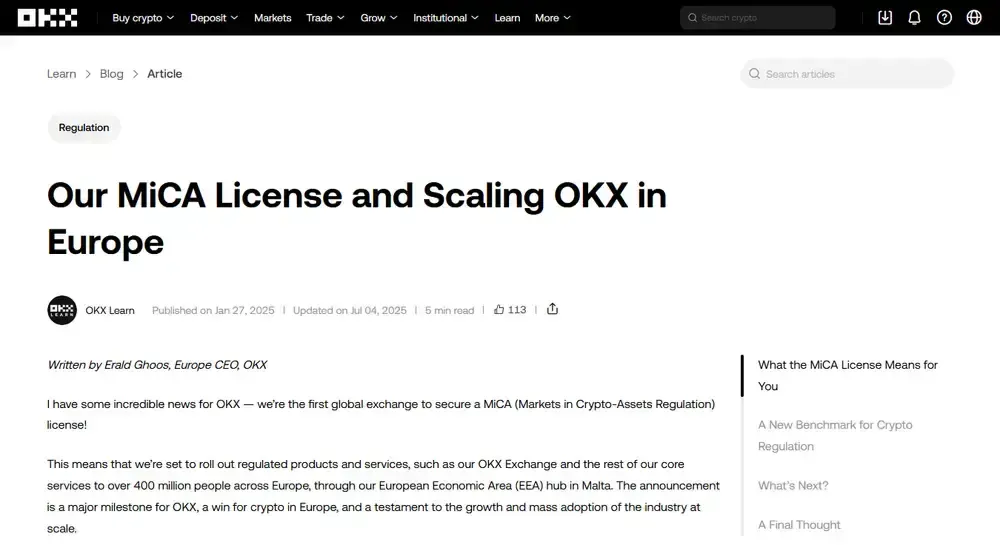
Does OKX Require KYC?
Yes, OKX requires users to complete Know Your Customer (KYC) verification before accessing most trading and account features. Individual account holders must provide government-issued identification, personal details, and in many cases proof of address to meet compliance standards.
The KYC process includes uploading documents such as passports, driver’s licenses, or national IDs along with a live selfie for verification. Applications are typically reviewed within 24 hours, after which users can fully trade, deposit, and withdraw funds on the platform.
Can I Use OKX in the US?
Yes, US customers can access OKX through OKCoin USA Inc., a Delaware corporation licensed as a Money Services Business with FinCEN. It also holds state-level Money Transmitter licenses in dozens of jurisdictions, covering both token-to-token and USD-to-token transactions.
However, services are not available to residents of Kentucky, New York, Texas, American Samoa, Guam, Northern Mariana Islands, and the US Virgin Islands. Customers in supported states can register, complete KYC, and trade within the scope of licenses approved by their local regulators.
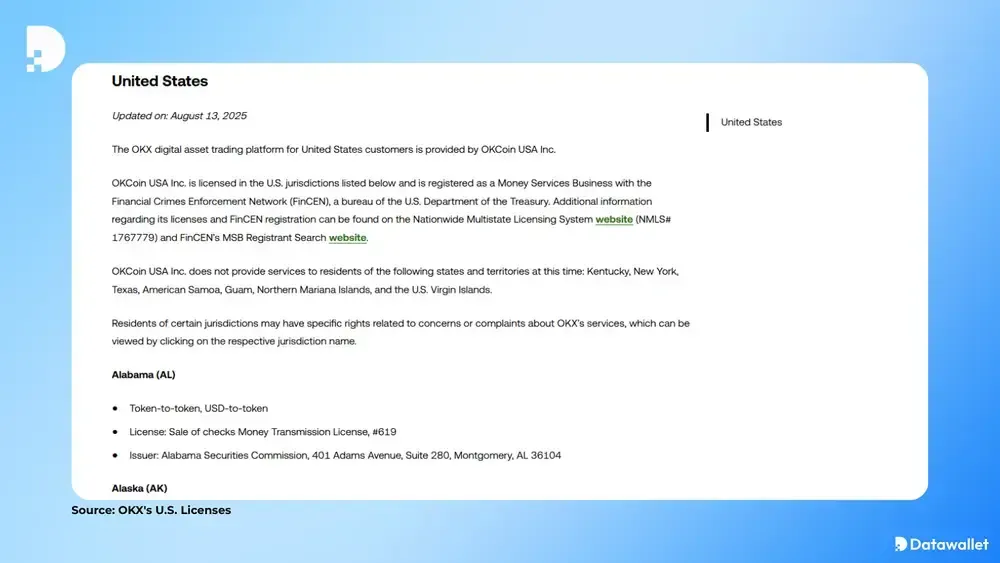
Is OKX Restricted in Europe?
OKX is not banned in Europe but operates under a regulated framework, most recently securing a MiCA license through its Malta hub. This license allows OKX to passport services across all 30 European Economic Area (EEA) member states under a unified set of rules.
From 30 December 2024, users in the EEA are also subject to the Travel Rule, requiring exchanges to collect sender and recipient details on crypto transfers. Deposits and withdrawals above €1,000 may require proof of wallet ownership, such as completing a Satoshi test for private wallets.
About OKX
OKX, headquartered in San Jose, is the world’s second-largest cryptocurrency exchange by daily trading volume. Founded in 2013 by Star Xu as Okcoin, the platform rebranded to OKX in 2017 to expand beyond exchange services into blockchain infrastructure.
The company offers a wide range of trading products, from instant crypto conversion and spot markets to derivatives such as futures and options. Users also have access to trading bots, copy trading, and institutional tools like RFQs and Nitro Spreads, alongside DeFi features, earning programs, and token launchpads.
OKX also posts monthly Proof of Reserves reports, which demonstrate a 1:1 backing of all customer assets. The most recent report in August 2025 verified $33.7 billion in primary assets across BTC, ETH, USDT, USDC, XRP, DOGE, SOL, and OKB, reinforcing its transparency and security standards.
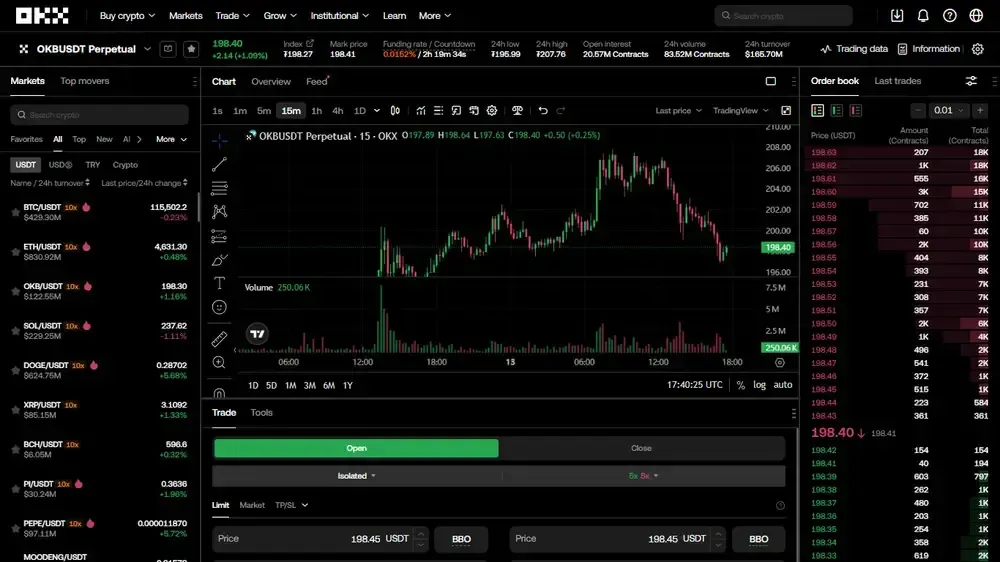
Final Thoughts
OKX’s footprint reveals a sharp contrast, with access available in over 100 supported countries while entire regions remain restricted by law or sanctions.
This global patchwork of permissions and exclusions is not accidental, as it directly mirrors the uneven progress and fragmented nature of crypto regulation worldwide.
In many ways, the map of OKX access doubles as a map of global financial openness, reflecting which jurisdictions welcome digital assets and which still resist them.
Frequently asked questions
Is OKX safe to use?
Yes, OKX is considered secure, as it applies multi-layered safeguards including two-factor authentication, cold wallet storage, and advanced risk monitoring. The exchange also publishes monthly Proof of Reserves reports verifying a 1:1 asset backing, which recently confirmed $33.7 billion in holdings.
What payment methods does OKX support?
OKX supports over 900 local payment methods globally, ranging from traditional bank transfers and cards to e-wallets and regional fintech products. Availability depends on location, with options like SEPA in Europe, PIX in Brazil, and UPI in India.
Does OKX have its own token?
Yes, OKX issues OKB, a utility token that provides trading fee discounts, access to Jumpstart token sales, and participation in ecosystem governance. OKB can also be used for staking, savings products, and payments with merchant partners.
What makes OKX different from other exchanges?
Unlike many competitors, OKX integrates centralized trading with decentralized finance through the OKX Wallet, giving users direct access to DeFi protocols, NFTs, and Web3 applications.

Written by
Antony Bianco
Head of Research
Antony Bianco, co-founder of Datawallet, is a DeFi expert and active member of the Ethereum community who assist in zero-knowledge proof research for layer 2's. With a Master’s in Computer Science, he has made significant contributions to the crypto ecosystem, working with various DAOs on-chain.
.svg)
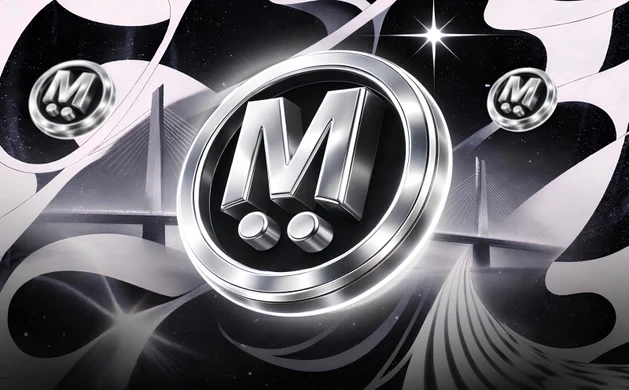


.webp)





